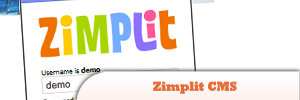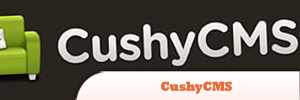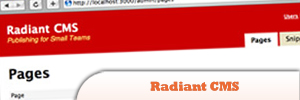10 Lightweight and Easy to Use Open-Source CMS
A Content Management System (CMS) with too many features is not always the best option for every web design project, sometimes all you need is something with a smaller and really lightweight. So we have collected a list of “light” (not literally lightweight but simpler systems) for you and your clients to manage content in harmony!
Obviously, WordPress is not mentioned here but is in my opinion the best Free, Open Source CMS going right now.
1. Zimplit CMS
Extremely lightweight, simple, customizable and open-source. It’s very easy to install, and easy to use via a simple web interface and it consists of only one core engine file.

2. CMS from Scratch
Is a quick, easy, and open-source solution that lets web designers give their customers a web site they can edit themselves.

Source
3. PageLime
Is a hosted Content Management System (CMS) for designers, web agencies, and web developers. It allows you to manage text, images, and documents on your site by logging into a web-app that’s hosted on our servers.

Source
4. CMS Made Simple
Is an open source ( GPL) package, built using PHP that provides website developers with a simple, easy to use utility to allow building small-ish (dozens to hundreds of pages), semi-static websites.

Source
5. CushyCMS
It’s built from the ground up with ease of use in mind – for both content editors and designers. It’s such a simple CMS that it takes less than 3 minutes for a web designer to implement.

Source
6. Zotonic
Is a fast, easy to use and open-source CMS. Its extensible, flexible and has been built from the ground up with rich internet applications and web publishing in mind. It can also work as a framework that is easy to extend and adapt for your specific use.

Source
7. sNews
Is a completely free, standards compliant, PHP and MySQL driven Content Management System. It is extremely lightweight, simple and customizable. It’s easy to install, and easy to use via a simple web interface.

Source
8. Radiant CMS
Is an open source CMS designed for small teams that has been built from the ground up to be as simple as possible, featuring an elegant administrative interface that centers around three key components: pages, snippets, and layouts.

Source
9. Pixie
It uses the latest web standards so whatever site you build, it’s accessible to all your visitors and is search engine friendly and you will love the fact that all you need to know is CSS to customize your site.

Source
10. Symphony
Symphony leverages open standards like XML and XSLT, and good old XHTML and CSS. Even the admin interface employs the widely-used jQuery library, so extension developers don’t have to learn a whole new framework when extending the back end.

Source
Frequently Asked Questions about Open Source CMS
What are the benefits of using an open-source CMS?
Open-source CMS platforms offer several advantages. Firstly, they are free to use, which makes them an excellent choice for small businesses and startups. Secondly, they are highly customizable. Users can modify the source code to suit their specific needs, which is not possible with proprietary CMS platforms. Thirdly, open-source CMS platforms have large and active communities. Users can get support and advice from other community members, and there are often numerous plugins and extensions available to add functionality.
How secure are open-source CMS platforms?
Security is a common concern when it comes to open-source CMS platforms. However, these platforms are often more secure than their proprietary counterparts. This is because they are regularly updated by a community of developers who work to identify and fix security vulnerabilities. Users can also contribute to this process by reporting any issues they encounter.
How easy is it to use an open-source CMS?
The ease of use of an open-source CMS can vary depending on the platform. Some platforms are designed to be user-friendly and have intuitive interfaces, while others may require more technical knowledge. However, most open-source CMS platforms offer extensive documentation and community support, which can help users get up to speed.
Can I use an open-source CMS for e-commerce?
Yes, many open-source CMS platforms can be used for e-commerce. They often have plugins or extensions that add e-commerce functionality, such as shopping carts and payment gateways. However, it’s important to ensure that the platform you choose is secure and can handle the specific needs of an e-commerce site.
What kind of support is available for open-source CMS platforms?
Open-source CMS platforms typically have large and active communities of users and developers. These communities often provide support through forums, blogs, and social media. Some platforms also offer professional support services for a fee.
How customizable are open-source CMS platforms?
One of the main advantages of open-source CMS platforms is their high level of customizability. Users can modify the source code to suit their specific needs, and there are often numerous plugins and extensions available to add functionality.
What are some examples of open-source CMS platforms?
There are many open-source CMS platforms available. Some of the most popular ones include WordPress, Joomla, Drupal, and Magento. Each of these platforms has its own strengths and weaknesses, so it’s important to choose the one that best fits your needs.
How do I choose the right open-source CMS for my needs?
When choosing an open-source CMS, you should consider several factors. These include the platform’s ease of use, customizability, security, support, and the specific needs of your website. It can also be helpful to read reviews and get advice from other users.
Can I migrate my website to an open-source CMS?
Yes, it is possible to migrate a website to an open-source CMS. However, the process can be complex and may require technical knowledge. It’s important to back up your website before starting the migration process, and you may want to consider hiring a professional to help.
What are the drawbacks of using an open-source CMS?
While open-source CMS platforms offer many advantages, they also have some drawbacks. These can include a steep learning curve, especially for users with little technical knowledge. They may also require more maintenance than proprietary platforms, as users are responsible for installing updates and fixing any issues that arise.
Sam Deering has 15+ years of programming and website development experience. He was a website consultant at Console, ABC News, Flight Centre, Sapient Nitro, and the QLD Government and runs a tech blog with over 1 million views per month. Currently, Sam is the Founder of Crypto News, Australia.

Published in
·Animation·CSS·Design·Design & UX·HTML·HTML & CSS·Illustration·Prototypes & Mockups·UI Design·February 8, 2017




